During the trial he stressed that he had no remorse. Not only did he not feel guilty, but his voice was proud of his war accomplishments. Especially one - genocide on a scale unprecedented in history. What crimes did Adolf Eichmann commit?
This one of the most famous Nazi war criminals categorically claimed that both he and Hitler's other henchmen were nothing but "little wheels in the great gear of the genocidal engine:wars."
In fact, Adolf Eichmann was the chief architect and executor of the mass deportations and murders of millions of Jews in extermination camps. Justice reached him many years after the fall of the Third Reich, which he so zealously served. And the sentence turned out to be as ruthless as the condemned torturer.
The severity required for promotion
In 1938, when Germany occupied Austria, Eichmann was a second lieutenant. He came to Vienna as a representative of the SD, ie the Security Service of the Reichsführer SS, with the task of solving the "problem" of two hundred thousand Austrian Jews. He arrested the leaders of the Jewish communities and then used their fellow believers to cooperate in organizing and financing the emigration. As we read in the latest book by Bettina Stangneth Eichmann before Jerusalem :
(...) was - and not only for Jewish communities - the "face" of Hitler's policy towards Jews. His contact with international Jewish organizations, which he himself demanded, and whose cooperation and, above all, money had to be obtained in order to increase the emigration quotas, strengthened this effect and more than one forced emigrant took the knowledge of Eichmann's name into exile .
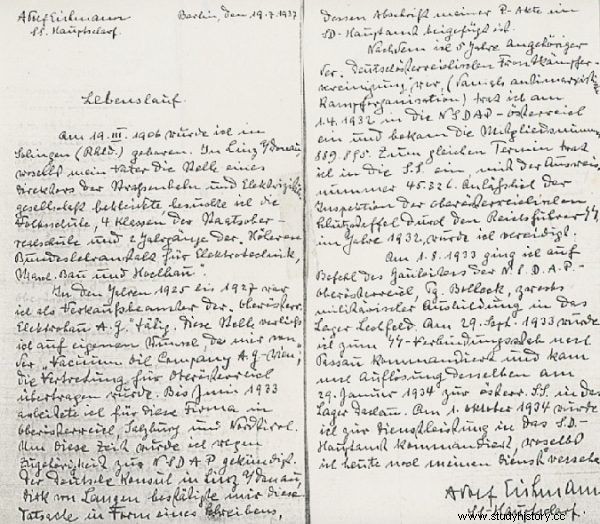
Eichmann's "references" attached to his application for promotion from SS-Hauptscharführer to SS-Untersturmführer in 1937. They include, among others information about the reliability and conscientiousness of the man, as well as the "strong and crystallized" willpower.
Eichmann's deportation activity in Austria was appreciated by his superiors. He was promoted to lieutenant not only for successfully carrying out the action, but also for the "necessary severity" he displayed in his actions. Proud of his achievements and the power he received, he wrote:"I have them in my hand, they will not take a single step without me."
It is hardly surprising that the new Gestapo chief, Heinrich Müller, entrusted the young and bright lieutenant with running the Central Bureau for Jewish Emigration. It was Eichmann who brutally deported half a million Poles from the territories incorporated into the Reich in December 1939 . He did the same two years later, in 1941, after the occupation of Yugoslavia. He also dealt with the removal of the Roma people from Germany and the occupied territories. Deportees were sent directly to death camps.
Drunken boast
When Heinrich Himmler ordered new and more "humane" ways to get rid of Jews than shooting, it was decided to reuse the carbon monoxide used in the 1930s to eliminate "useless individuals" from society, such as the mentally ill. Belarussian and Ukrainian Jews were then stuffed like cattle in hermetically sealed loading chambers on trucks and then murdered with exhaust fumes .
In 1941, the plan to exterminate the Jewish people on a massive scale began to be implemented. The memorandum by the Nazi officer Hermann Göring - who, through Reinhard Heydrich, reportedly handed over to Eichmann the Nazi order to prepare a plan for a "Final Solution" - was in fact to be written by Eichmann himself. The war criminal did not fail to boast about this fact during the trial in Jerusalem, 15 years after the end of the war.
At a trial in 1961, his attorney stated that it was merely drunken bragging. There is no doubt today, however, that Eichmann participated in the famous Wannsee Conference in January 1942, at which German prominent figures of the Nazi state service gathered. It was here that decisions were made on the systematic and mass extermination of European Jews. And while Eichmann later claimed that he was only a minor player (which in some ways was true as he was the lowest ranked player at the time), his role should not be underestimated.
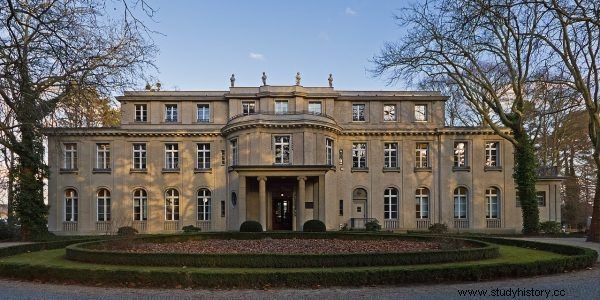
Villa at 56/58 Großer Wannsee, where a conference of German prominent figures of the Nazi state service was held on January 20, 1942, chaired by Reinhard Heydrich. It was here that decisions were made regarding the practical solution of the Jewish question. There is no doubt that Eichmann participated in it.
Eichmann took part in an hour and a half discussion about how to kill more effectively, how to improve the process of murdering and getting rid of bodies, and how to transport Jews faster from place to place. The Nazi officer was in his element - perfectly organized, with a ready plan for every situation. He was fully trusted as the best person to carry out a genocide operation .
No distractions
The name of Dieter Wisliceny is mainly associated with the introduction of the obligation for Jews to wear the yellow Star of David. This SS captain, however, also played an important role during the Nuremberg trials. When he testified in the case of Eichmann, under whom he served 11 years, and whose family he was friends with, he was asked if he had had the opportunity to witness Himmler's order for the "final solution" of the Jewish question.
The captain stated that when he asked Eichmann to explain the term used by Himmler in the document, the Nazi officer replied that "the concept and name ... were a cover for the planned biological annihilation of the Jewish race in the eastern territories," and that he was personally entrusted with carrying out this order. Then Wisliceny turned to the superior with these words:"Let us pray that our enemies will never have the opportunity to do the same to the German people." Eichmann only scolded the subordinate not to be too emotional.
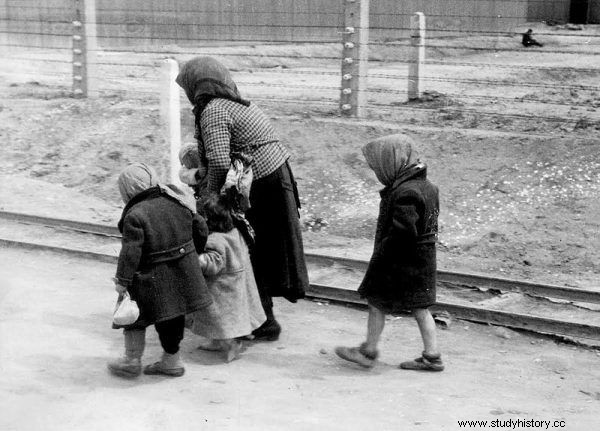
A Jewish family on their way to the gas chamber (May / June 1944) at KZ Auschwitz-Birkenau. This photo was taken by SS man Bernhard Walter with the permission of Adolf Eichmann.
"Popes have given orders"
At his trial in 1961, Eichmann emphasized that at the Wannsee conference all the gathered had an identical attitude towards Jews, so there could be no question of his personal guilt. He relied fully on the decisions of his superiors, stressing that it was "the popes gave the orders".
He believed that the more zealously he performed his tasks, the more he would serve the Reich. In his thinking, he dehumanized the people who, on his orders, were sent to death camps. He wrote about the Jews that they “stole the Germans' breath of life” . They had to be exterminated like a plague; as ordered by Heydrich - to cleanse Europe from east to west.

The judges at the trial of Adolf Eichmann in Jerusalem 1961:Benjamin Halevy, Moshe Landau and Yitzhak Raveh.
Eichmann showed the greatest zeal in fulfilling his tasks in Hungary in 1944. In just two months before the Red Army entered the country, organized the transport of 427,000 Hungarian Jews to the Auschwitz-Birkenau extermination camp . About three-quarters of them were killed in gas chambers, and when the crematoria did not keep up with burning the corpses, they were set on fire in hastily dug pits. The camp was covered with smoke so thick that it was clearly visible in the photos taken by the pilots of the American reconnaissance planes. "It was indeed a record that was never recorded before or after," Eichmann was supposed to recall, with evident pride in his voice.
Deathmaster
One of the witnesses in the Eichmann trial described him as "the greatest deathmaster." Israel's Attorney General, Gideon Hausner, listed all his crimes meticulously. He emphasized that it was Eichmann who was responsible for the deaths of millions of Jews in the gas chambers and hundreds of thousands of others shot by the Einsatzgruppen (Nazi operational groups) and massively deported, locked up in ghettos and other places of concentration.
According to the prosecutor, the Nazi criminal was also responsible for the death of Hungarian Jews as a result of deportations carried out by the Sonderkommando under his control. In addition, from 1942, Eichmann pursued a policy in Germany and in the occupied territories aimed at preventing the reproduction of Jews, which included, inter alia, a birth ban and, if pregnant, an abortion order.
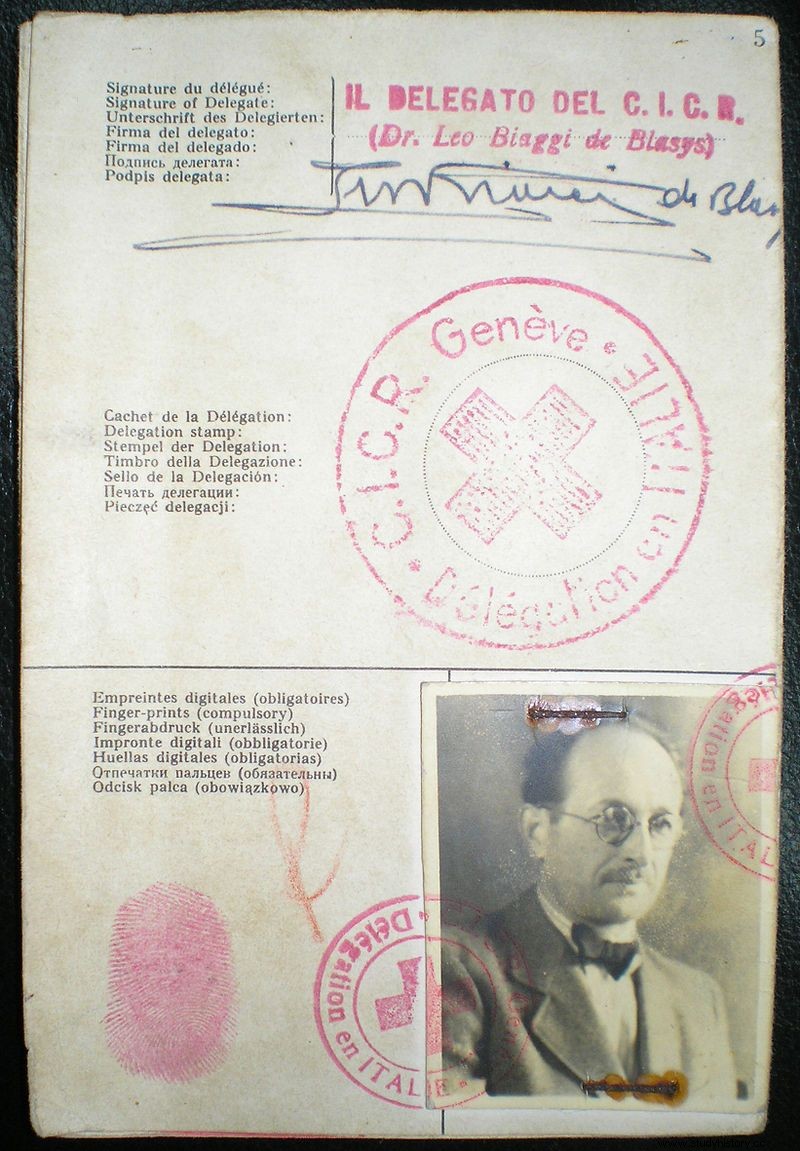
In order to escape his responsibility after the war, Eichmann made his way to Argentina. The photo shows a passport under the false name "Ricardo Klement", thanks to which a Nazi officer managed to do so in 1950.
He was also accused of plundering Jewish property on a massive scale, including expropriation and theft, and forcing him to pay contributions to finance deportations to death camps. Only between 1942 and 1943, as part of an action to exterminate European Jews code-named "Einsatz Reinhardt", appropriated property estimated to be worth 200 million marks. It was on his order that the murdered Jews were taken away from all their valuables, gold teeth were pulled out and their hair was cut .
Six million accusers
During the interrogations of Adolf Eichmann, 76 reels of audio tape were recorded, and the transcription took over 3,500 pages, from which six extensive volumes of files were composed. In the light of these documents, Eichmann was not only the initiator, organizer and zealous executor of the policy of extermination of Jews, but also a criminal responsible for the death of specific people. He received reports from his subordinates both on extermination actions and individual executions.
Eichmann was lost to pride and boasts, which were meticulously remembered and quoted at the trial. The so-called Sassen tapes from the 1950s have survived, in which the man not only admitted to the crime, but also expressed his regret that he did not operate efficiently enough and did not manage to get rid of all the Jews . Therefore, such a monster could not escape punishment. Hausner was not going to let this happen, whose introductory speech, with a famous paragraph quoted many times in the literature, touched not only those present in the courtroom, but the entire international community:
When I stand here before you, the judges of Israel, leading the charge against Adolf Eichmann, I am not standing alone. There are six million accusers with me. However, they cannot stand up and point the accusing finger at the glass cage and shout to the man sitting there, "I accuse." Their ashes lie on the hills of Auschwitz and the fields of Treblinka, flushed by Polish rivers, and their graves are scattered across Europe. Their blood screams, but we can't hear her voice. So I will be their spokesman and make this terrifying accusation on their behalf .
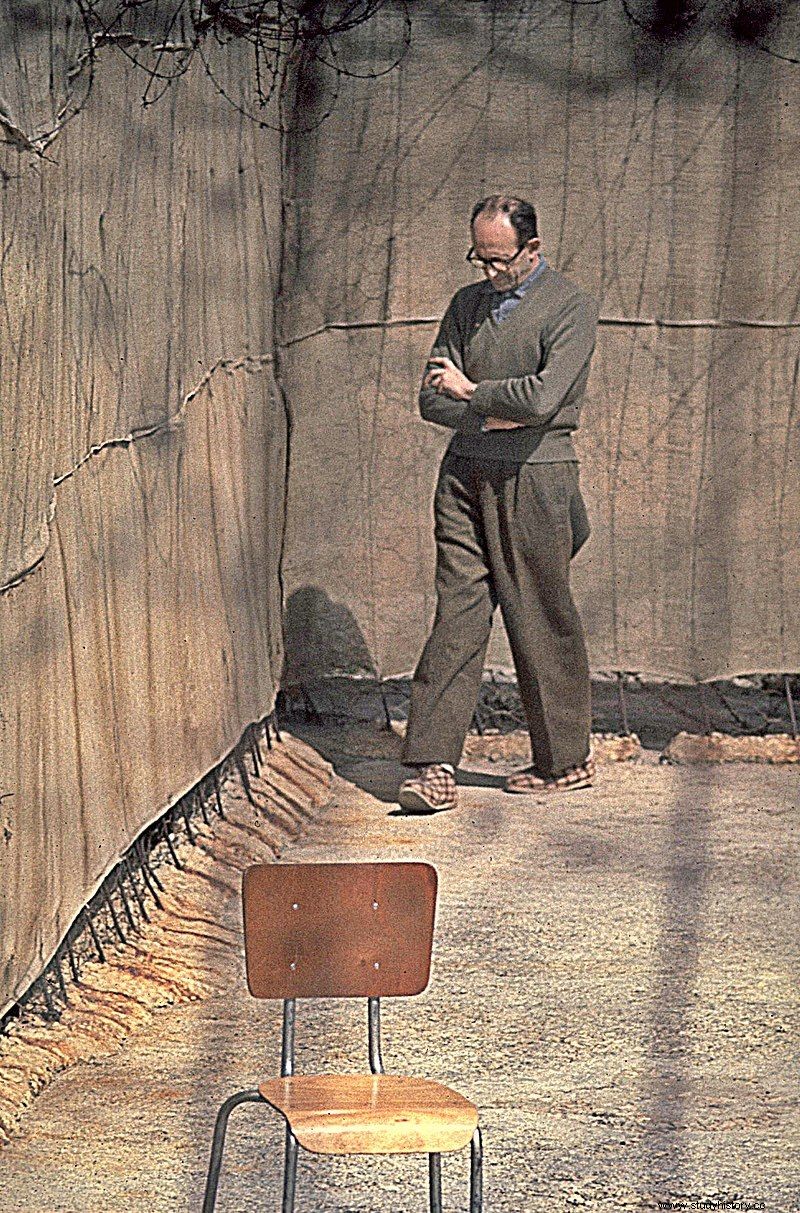
Adolf Eichmann in an Israeli prison in 1961. The verdict, which was soon to be heard by almost the entire international community, considered a triumph of the judiciary.
A victim of wrong conclusions
Eichmann consistently stuck to his line of defense until the very end. “My position was identical to that of millions of other people who had to listen. The only difference was that extremely heavy obligations were imposed on me. " He argued that he was not a criminal but a "victim of wrong conclusions." In Bettina Stangneth's latest book Eichmann Before Jerusalem we read:
Everything he did - Eichmann continues - he did "with a clear conscience and faith in his heart," convinced of the "national state of greater necessity" ("Volksnotstand"), which still "proclaimed" "the leadership of the then German Reich", as well as "the necessity of total war", so he acted like a patriot .
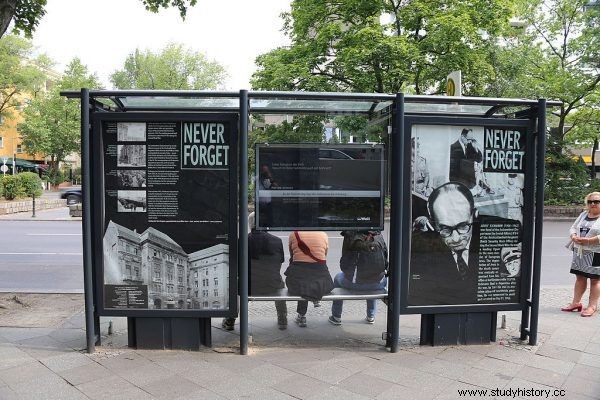
Eichmann answered for his crimes, which were not forgotten by him, even 15 years after the end of World War II. The Nazi officer himself was also not forgotten after his death. Pictured is a memorial at a bus stop near Eichmann's headquarters at Kurfurstenstrasse 115, now occupied by the hotel.
On the morning of Friday, December 15, 1961, at the 121st hearing in the Adolf Eichmann case, he was finally convicted. The court sentenced Eichmann to death for crimes against the Jewish people, for crimes against humanity and for war crimes. The man was executed by hanging on May 31, 1962 . In the last words, he greeted his family and friends and reiterated that he had only obeyed the laws of war and his country.
